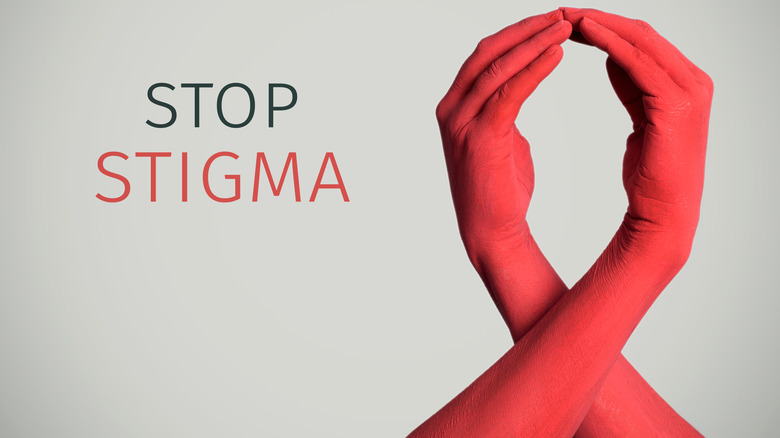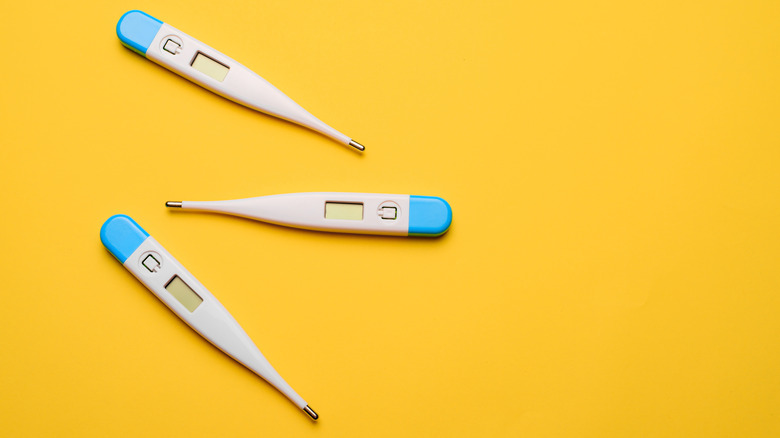Billy Porter's HIV Diagnosis Explained
In May, actor and singer Billy Porter revealed he has been living with HIV for nearly 14 years. In an interview with The Hollywood Reporter, the "Pose" star opened up about his HIV-positive diagnosis and explained why he chose to keep it a secret for so long. According to Porter, he hid his HIV status from almost everyone in his life for fear of what it would do to his career.
"For a long time, everybody who needed to know, knew — except for my mother. I was trying to have a life and a career, and I wasn't certain I could if the wrong people knew," Porter told the publication. "It would just be another way for people to discriminate against me in an already discriminatory profession. So I tried to think about it as little as I could. I tried to block it out."
Porter also revealed that his religious upbringing made him hesitant to tell his mother about his status. He said he initially wanted to spare her any further "persecution" she had already faced from her religious community due to his sexual orientation, but the pandemic forced him to reflect on the trauma in his life and he decided it was finally time to open up and speak his truth.
What it means to be HIV-positive, according to Billy Porter
"This is what HIV-positive looks like now. I'm going to die from something else before I die from that," Billy Porter told The Hollywood Reporter. "My T-cell levels are twice yours because of this medication. I'm the healthiest I've been in my entire life."
What does it mean to be HIV-positive? Human immunodeficiency virus (HIV) is a virus that attacks the immune system by damaging cells that help the body fight off infection. If left untreated, it can lead to acquired immunodeficiency syndrome (AIDS), according to WebMD. HIV weakens your body's natural defenses by targeting a certain subset of white blood cells called CD4 T-cells. When the virus infects and destroys these cells, it makes it more difficult for your body to fight off other infections. HIV also uses CD4 T-cells to replicate and create new copies of the virus to infect more cells. Although your body responds to this attack by producing more CD4 T-cells, it can't replace them fast enough. As a result, your immune system weakens, leaving you vulnerable and susceptible to severe and long-lasting infections.
Fortunately, as Porter alluded to, HIV can be well-managed with medication. By getting an early diagnosis and starting antiretroviral therapy, one can prevent cells from becoming infected and weakening the immune system.
How is HIV transmitted?
Unlike other viruses, HIV can only be contracted through certain activities that involve the exchange of certain bodily fluids, like blood, semen, breast milk, and vaginal or anal fluids (via Healthline). Some of the ways the virus can be transmitted from person to person include vaginal or anal sex, sharing needles or syringes, breastfeeding, sharing unsterilized tattoo equipment, exposure to blood or other fluids through a needle prick, and during pregnancy, labor, or delivery from pregnant person to baby.
HIV can also be contracted through a blood transfusion or an organ transplant, but the likelihood of this occurring in the United States is very slim. Overall, HIV is most commonly contracted through unprotected sex or needle sharing. On the other hand, the virus cannot be transmitted through skin-to-skin contact, hugging or kissing, saliva, sweat, or tears, sharing food or drinks, sharing a toilet, air or water, or insect bites.
Who's at risk of HIV infection?
Although anyone of any age, race, gender, or sexual orientation can contract HIV, there are some populations in the U.S. that have a higher risk of infection. According to the Centers for Disease Control and Prevention, gay and bisexual men are most affected by HIV, and gay and bisexual men of color are at a greater risk of infection. In 2018, gay and bisexual men of all races accounted for 69% of new HIV diagnoses. Of that percentage, Black gay and bisexual men accounted for 26% of new diagnoses, while Hispanic gay and bisexual made up 21% of new HIV infections, per the CDC.
This is largely due to the societal stigma surrounding sexual orientation and HIV status and a lack of access to testing, treatment, and preventative care (via Prevention). Additionally, men who engage in receptive, unprotected anal sex are at a greater risk of contracting HIV.
What are the symptoms of HIV?
The first few weeks of infection are known as the acute HIV infection stage. Acute HIV infection develops within two to four weeks of contracting the virus (via Healthline). During this time, some people will have no symptoms, while others will begin experiencing flu-like symptoms. Some of these symptoms include fever, chills, sore throat, headache, nausea, aches, swollen lymph nodes, and abdominal pain.
These symptoms can range in severity and can either last a few days or several weeks, depending on the person. Since these symptoms are so similar to other illnesses, it's easy to mistake them for mononucleosis (mono) or the flu. As the virus progresses and enters the clinical latency stage, however, the list of potential symptoms grows to include night sweats, weight loss, fatigue, skin rashes, pneumonia, shingles, vomiting, diarrhea, and recurrent oral or vaginal yeast infections. This stage of HIV can last for years or even decades. If left untreated, the virus can lead to AIDS.
How is HIV diagnosed?
Receiving an early diagnosis and getting treatment can significantly reduce your viral load. That's why it's important to get tested regularly. If your viral load is undetectable, you can't spread or transmit HIV (via Mayo Clinic). Regardless of your age or gender, the CDC recommends that every person get tested for HIV at least once, but people who are at a greater risk of contracting the virus should get tested every year.
There are three different types of HIV tests: antibody, antigen/antibody, and nucleic acid. Antibody tests check for HIV antibodies in your blood, while an antibody/antigen combination tests check your blood for both HIV antibodies and HIV antigens, which are detectable within weeks of exposure to the virus. Nucleic acid tests, on the other hand, look for the actual virus in your blood and can deliver an HIV diagnosis a little more than a week after exposure. A positive test result of any of these three tests means HIV.
Although a positive diagnosis may seem daunting, HIV can be well-managed with medication and specialized care. If you think you have been exposed to HIV, talk to your doctor about getting tested.






